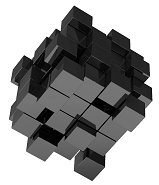 |

|
Content Owner: Herman Rutten | ||||
Summary
Efficiency and Performance
Details
Deduplication and compression can provide two main advantages:
1. Efficiency (space savings)
2. Performance (speed)
Most of the time deduplication/compression is primarily focussed on efficiency.
Key performance metrics of the Cisco HyperFlex (HX) platform architecture include minimizing storage latency and maximizing storage throughput. With HX a write is logged in low-latency flash (NVMe SSDs) and immediately acknowledged to the client, minimizing latency. A full dedup lookup and verification is not performed prior to acknowledging a write, because this can potentially increase latency. However, incoming data is compressed before logging to NVMe flash using a lightweight algorithm to minimize impact to latency. As many typical write patterns that might benefit from dedup also compress well, this reduces the amount of data written to the write log and thus optimizes NVMe flash capacity.
1. Efficiency (space savings)
2. Performance (speed)
Most of the time deduplication/compression is primarily focussed on efficiency.
Key performance metrics of the Cisco HyperFlex (HX) platform architecture include minimizing storage latency and maximizing storage throughput. With HX a write is logged in low-latency flash (NVMe SSDs) and immediately acknowledged to the client, minimizing latency. A full dedup lookup and verification is not performed prior to acknowledging a write, because this can potentially increase latency. However, incoming data is compressed before logging to NVMe flash using a lightweight algorithm to minimize impact to latency. As many typical write patterns that might benefit from dedup also compress well, this reduces the amount of data written to the write log and thus optimizes NVMe flash capacity.
